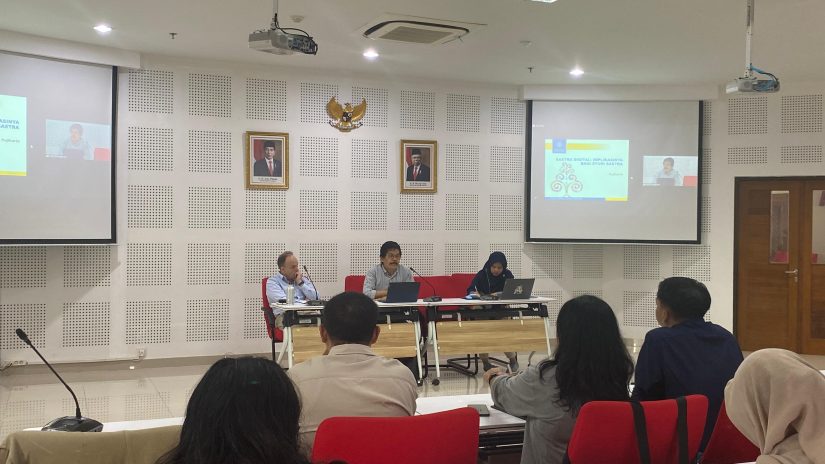
The Department of Language and Literature, Faculty of Cultural Sciences, Universitas Gadjah Mada held an Expert Lecture on Literature with the theme “Literature in Digital Age” on Thursday, July 18, 2024. This event took place from 12.30 to 15.30 in Sogeondo Room 709 FIB UGM and virtually through Zoom Meeting. The lecture is an open forum for the general public, although offline attendance is limited. The speakers include Prof. Angus James Nicholls, Ph.D. from Queen Mary University of London, Dr. Pujiharto, M.Hum. from Faculty of Cultural Sciences UGM, and Miguel Escobar Varela, Ph.D. from National University of Singapore. The moderation of the event was conducted by Alvanita, S.S., M.Ed. from Faculty of Cultural Sciences UGM.
Digital literary works include various formats such as e-books, literary blogs, literary websites, interactive stories and digital poetry. Some digital literary works also utilize multimedia elements such as images, audio and video to enhance the reading experience. This shows the development and adaptation of literature in the digital era, where technology becomes a means to express ideas and emotions in a more dynamic and interactive way. A new phenomenon in the literary world emerges with the existence of works created by robots or machines such as ChatGPT. Martin S.’s book “Poet as Machine” highlights this phenomenon. In the concept of the poet as machine, the use of language is managed entirely by the machine, and the resulting literary work is able to create its own narrative world through the use of carefully programmed language. This illustrates a new evolution in the way we understand creativity and the relationship between technology and art, as well as how algorithms can be a tool for creating impressive and original works.
The phenomenon of digital literature not only includes works created by writers but also involves the active participation of readers in the writing process, which then leads to the development of the study of fan literature. The history of this study can be traced back to Damono’s contribution in 1978 which introduced the importance of the study of popular literature, especially from the perspective of literary sociology. This study highlights how literature, especially in digital form, has changed the way readers interact and contribute to the creation of literary works. Discussions on this subject continue among modern literary scholars, exploring the role of technology in shaping and influencing contemporary literary discourse. This event is expected to be a means to explore and understand the development of literature in the growing digital era.

